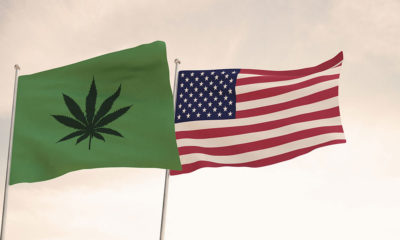
Legal
High There, Officer: Surviving a Cannabis DUI
Amid the expanding realm of cannabis legalization, road safety takes the spotlight.
Whenever a legal cannabis market is about to roll out in this country—it doesn’t matter which state—law enforcement starts getting squirrely. In their anxious minds, legal weed means that the roadways of their respective state are about to become a veritable hazard zone full of evil, reckless stoners, all red-eyed, laughing uncontrollably, on a dope-addled mission to slaughter as many women and children as humanly possible before the smoke clears. That’s why, in the weeks leading up to the day when adults 21 and over can finally walk into a dispensary and buy marijuana, it’s not unusual to hear a lot of jibber-jabber in the media about how law enforcement is aggressively “training” officers and “ramping up” patrols. Cops can’t stand the fact that they can no longer bust people for pot possession, so they set out to arrest high drivers and hand out cannabis DUIs instead. They want the non-consuming public to know that their brave heroes are coming to the rescue.
Unlike in the case of alcohol, however, there isn’t any technology to help police arrest motorists for cannabis impairment. There’s no effective pot breathalyzer on the market, nothing that police can employ to show that a motorist was using marijuana before getting behind the wheel. These agencies, instead, often rely on field sobriety tests to get the job done. But there’s one major flaw: These roadside exams are neither scientific nor accurate. No, instead of using science, police may try to assess whether a motorist is high by shining a light in their eyes, having them walk a straight line, touch their finger to their nose or stand on one leg. In most cases, no matter if the driver passed this stoner sideshow and circus act with flying colors, the officer is going to say that they noticed signs of impairment. From there, the shakedown gets even wilder.
Police may then ask to execute a saliva test that determines the presence of THC metabolites. If there’s pot in the driver’s system, they’re going to fail. Police can then drag them in for a more accurate reading, usually forcing them to give a blood or urine sample. The problem with these tests is the driver could have consumed marijuana weeks before being pulled over and still test positive for impairment. Some states have zero-tolerance laws, which means any amount is an arrestable offense. So, guess what happens if a motorist finds themselves in this jam? They’re likely going to get slapped with a Driving Under the Influence of Drugs (DUID) charge, probably lose their license, pay fines, attend drug classes and do hours of community service.
Interestingly, a recent study finds that field sobriety tests for cannabis impairment are bogus. Even though participants who smoked marijuana did poorly in field sobriety tests, so did the placebo group. That means it doesn’t matter whether a motorist is high, sober or just nervous, they are probably going to fail if they agree to one. Even the federal government admits that these roadside testing methods are “unreliable indicators of marijuana intoxication.” Nevertheless, police all over the country are still permitted to use them. Why? Because it’s all they have.
Police will do anything to arrest someone for a cannabis DUI, especially in a newly legal market just getting off the ground. But before they can do that, they need a reason to conduct a traffic stop. And they are always looking for a reason, no matter how vague, to do just that. Almost anything is cause for one. “A cop told me one time that he pulled me over because my license plate light was out,” said Mitch from Springfield, OH.
It could even be that air fresher dangling from a motorist’s rearview mirror that becomes their undoing. “The cop said it was obstructing my view,” Keith, 37, said, referring to a strange traffic stop he experienced a few years ago in Minnesota. “I had no idea that was a thing.”
Once police get a driver to the side of the road, they’ll also be looking for ways to get inside the car. They can achieve this by establishing probable cause and again that could be based on just about anything. “This cop asked if I had any drugs, weapons or anything else he should know about. I told him no, but he asked to search my car anyway,” Keith recalled. “There wasn’t anything in the car, so I let him go ahead. I figured it was easier that way. He searched my car from front to back and found nothing. When he asked me if I wanted to know why he wanted to search it in the first place, he shined his light on what he said he thought was a joint. It was a French fry. That’s when I realized the police can literally do anything to get what they want. It’s scary.”
Yes, it is.
Although the US Constitution is intended to protect the rights of citizens, on and off the road, make no mistake about it; it’s us against them. And the police will do whatever it takes to score a win. Therefore, it’s crucial for every motorist to understand their rights and be able to apply them in any situation where they are stopped by police. This is doubly true for those living in legal states where officers are working their tails off to arrest as many people as possible for driving high.
Florida-based attorney Andrew Simko, on TikTok under the handle @justaskandrew, says the best course of action is to never admit guilt. If a motorist is a recreational or medical marijuana user, they shouldn’t even mention it to police. It’s none of their business and any acknowledgement can and typically will fuel further interrogation.
“You don’t want to tell the officer you just smoked or anything like that,” Simko says. “The worst thing you can say if an officer asks if you recently smoked marijuana is to say yes or that you drive high all the time, or that marijuana doesn’t impair your driving.” That’s not going to bode well.
In places such as Florida, where cannabis is legal for medicinal use, police cannot test drivers for THC levels. So, even if police suspect that a motorist has been driving high, they can’t prove it. “Law Enforcement isn’t able to tell if you used marijuana that day or 30 days ago,” Simko said. “That’s why it’s especially important to not admit to an officer you just used marijuana because they would not be able to find this out otherwise.” In a state where police measure THC levels to make arrests, Simko says keeping quiet about pot consumption is crucial. “It is still important to not give the officer any additional information that can be used to build the case against you,” he said.
Because building a case is what they’re trying to do.
Yep, anything the driver says or does will undoubtedly be used against them. But that doesn’t mean acting like a pretentious goon. “When dealing with a police officer in this situation you want to be as polite as possible,” Simko advised. “Being rude or combative towards an officer that pulls you over will only make things worse for you.” Even a motorist’s actions can be used against them in court if they happen to get arrested for anything, so ensuring the interaction is as pleasant as possible is paramount. “You have to expect that this entire encounter will be on camera,” Simko added. “Juries like people that treat other people with respect. If a jury sees that you were fighting with the officer the entire stop, this could increase the chances for a conviction.”
Remember, the Fifth Amendment gives every motorist the right to remain silent. If an officer pulls a motorist over and starts asking a bunch of random questions, there is no obligation to answer them. In fact, according to a TikTok post from Pot Brothers at Law, there are 25 words every motorist should practice to protect themselves against a sobriety test. When police come up to the window, the driver should ask, “Why did you pull me over?” Then, when the officer starts asking them questions, the driver should respond politely with, “I’m not discussing my day.” If the cop proceeds with their roadside interrogation, asking even more questions, the next words out of the driver’s mouth should be, “Am I being detained or am I free to go?” If being detained, the driver should say, “I plead the Fifth,” and from that point forward keep their big fat trap shut.
It’s also a good idea to have a defense attorney on hand just in case the situation spirals out of control. Cops don’t always appreciate when motorists make their jobs harder and some may lash out with intimidation tactics. At that point, a motorist can say, “I want my lawyer,” invoking the Sixth Amendment. The officer is then legally required to stop grilling the motorist. That might not keep them from dragging the poor bastard to jail, but it will prevent the cops from building a case that can be won in court. Therefore, in addition to remaining silent, the motorist should be prepared to call a lawyer once they get to the station. The pros will be able to handle it from there.

























